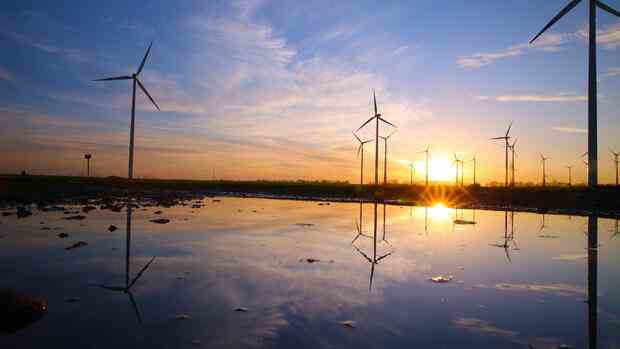The Commission wants to ensure that investments also take place in structurally weak regions.
(Photo: IMAGO/BildFunkMV)
Brussels The EU Commission wants to make it easier for EU member states to support companies with large sums of money. This should enable them to counter the aggressive economic promotion in China and the USA.
To this end, the rules for state aid are to be relaxed and approvals accelerated. To be funded:
- Investments in renewable energies and energy storage, including synthetic fuels (e-fuels) and biomethane, as well as projects with which industry converts to climate-neutral production methods. In certain cases, the state should even be able to take over the entire investment sum.
- The production of green technologies, i.e. batteries, solar systems, wind power plants, heat pumps, electrolysers, CO2 capture and components that are necessary for the production and recycling of critical raw materials.
- In poorer regions, small companies should be able to get up to 350 million euros and 55 percent of their investment sum. Large companies in rich regions should be able to receive up to 150 million euros and 15 percent of their investment sum. There are gradations in between.
>> Read here: What does dependence on China mean for the energy transition?
It is unusual for the EU to support mass production. Many member states are critical of the measure. This emerges from an internal presentation by Commission officials, which is available to the Handelsblatt. At the same time, however, the Commission is under pressure from the American Inflation Reduction Act (IRA), which has been in effect since August 2022 and through which billions are flowing into the production of hydrogen and batteries.
Investments should take place in structurally weak regions
In the past few weeks and months, some companies have announced that they will take these subsidies with them, while at the same time shelving projects in Europe.
Investments in renewable energies and energy storage, including synthetic fuels (e-fuels) and biomethane, are to be promoted, among other things.
(Photo: INERATEC GmbH)
The Commission states that the measures are temporary, targeted and adapted to the situation. The need for subsidies is carefully examined and the objective of cohesion is respected. In Brussels, this means the concern to equalize the living conditions within the EU.
>> Read here: “More important than oil” – The EU wants to increase the production of rare minerals
Accordingly, the Commission wants to ensure that investments also take place in structurally weak regions. Projects should only be funded if they are either created in a structurally weak region or at least three member states are involved.
As an example, a fictitious case is recorded in the presentation in which a battery factory is funded in an economically strong region, with the preliminary products coming from two different, structurally weak regions.
Subsidies are traditionally controversial in the EU because there is a risk that EU countries will outbid each other with funding commitments.
(Photo: IMAGO/Chris Emil Janssen)
The aid under the new rules must be applied for by the end of 2025, but can also be paid out later. Subsidies are traditionally controversial in the EU because there is a risk that EU countries will outbid each other with funding commitments.
Now there is also the challenge of avoiding such a subsidy race between the European Union and the USA.
More: EU is pushing for more long-term contracts in the electricity market
